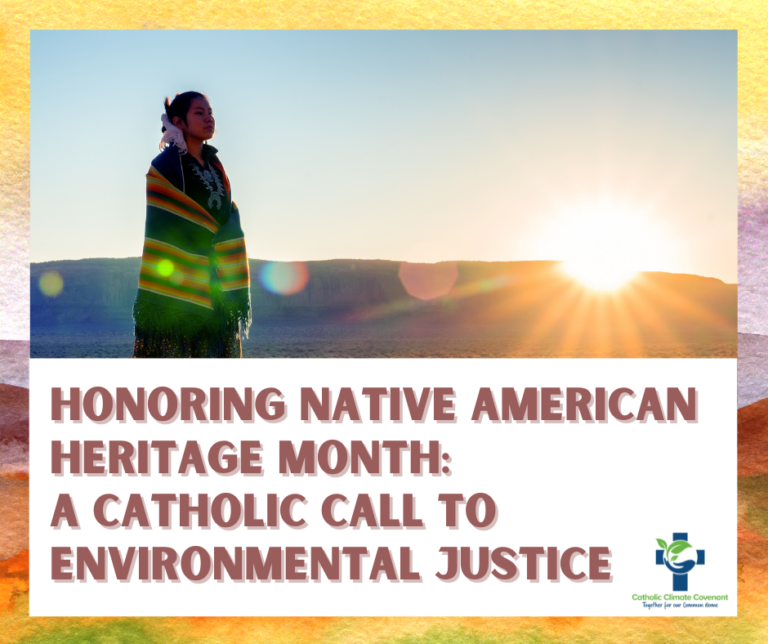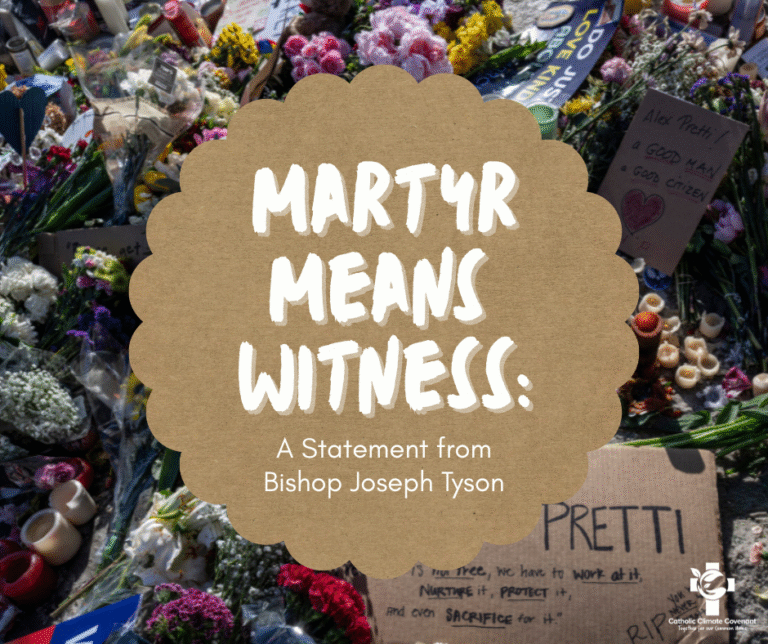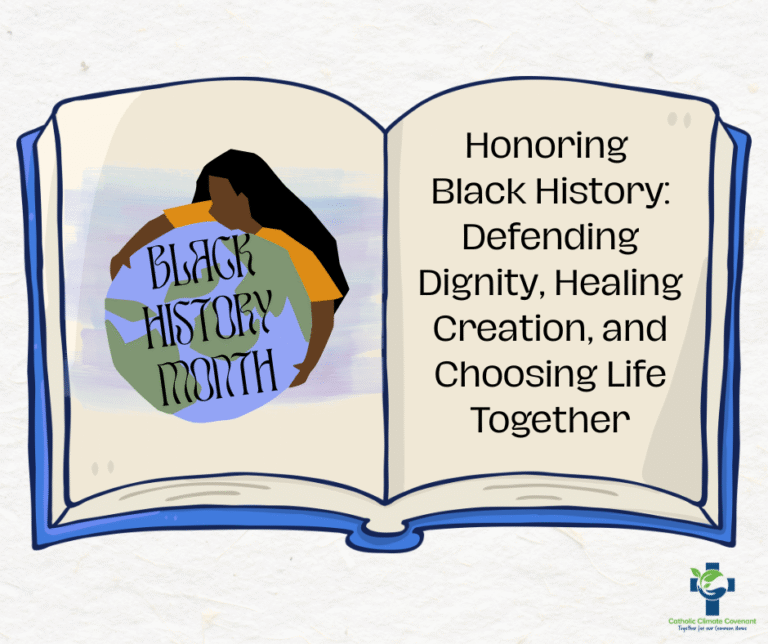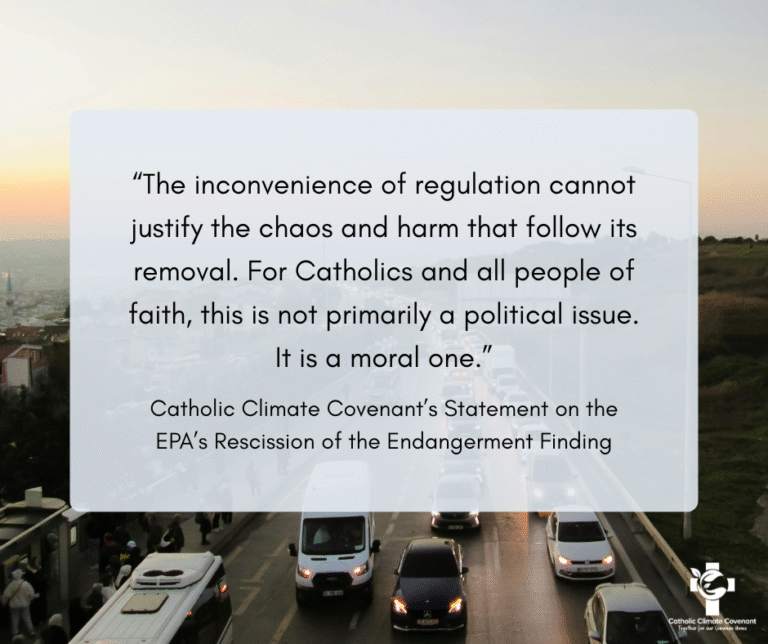As we celebrate National Native American Heritage Month this November, we are invited to reflect on the deep spiritual and cultural wisdom of Native American communities and the profound relationship they share with the land, water, and all of creation. This month is an opportunity to not only honor the contributions of Native Americans to our society but also to recognize the ongoing struggles for environmental justice and reconciliation that many Native communities face.
For Catholics, this month also invites us to connect the teachings of our faith with the lives and experiences of Native Americans. The Church’s commitment to environmental justice, as articulated in Laudato Si’ — Pope Francis’ encyclical on the care of our common home — echoes the values long held by Native peoples: respect for the earth, care for the most vulnerable, and the recognition that all of creation is interconnected.
Native American communities have long understood the intrinsic link between spirituality and the earth. From the Ojibwe to the Navajo, from the Lakota to the Hopi, Native traditions emphasize a profound reverence for nature. The land, animals, and waters are seen not merely as resources to be used, but as sacred gifts to be cared for and protected. This reverence aligns closely with Catholic Social Teaching, which calls for the protection of creation and the well-being of all people, particularly the most vulnerable. In Laudato Si’, Pope Francis warns that environmental degradation, especially the destruction of ecosystems and the exploitation of natural resources, disproportionately affects the poor and marginalized — those who often have the least capacity to protect themselves.
“The poor and the earth are crying out. The earth herself, burdened and laid waste, is among the most abandoned and maltreated of our poor.”
— Laudato Si’, #2
For Native Americans, many of whom live in rural and often impoverished regions, the consequences of environmental degradation are felt deeply. From the loss of ancestral lands to contamination of water sources, many Native communities bear the brunt of environmental harm caused by industrial practices. Whether it’s the destruction of sacred lands by pipelines or the pollution of rivers by mining operations, these injustices must be confronted through the lens of both social justice and environmental stewardship.
In the face of these challenges, many Native American groups have been at the forefront of environmental movements, advocating for the preservation of land and water, for justice, and for the respect of their traditional ways of life.
Catholic Climate Covenant stands in support of these efforts, calling all people of goodwill to heed the cry of the earth and the poor.
Throughout history, Native Americans have not only faced significant cultural and environmental challenges but have also been witnesses to the faith. Saint Kateri Tekakwitha, the first Native American saint, is a powerful example of faith, resilience, and reverence for creation. Born in 1656 to the Mohawk tribe, Kateri faced tremendous hardship, losing both her parents to smallpox and enduring persecution for her Catholic faith. Yet, through it all, she embraced the beauty of creation, living a life of humility and piety, and became known for her care for the environment and her community.
“Kateri is a symbol of the enduring witness of the Native American people to the Christian faith and to the love of creation that is at the heart of the Gospel.”
— Pope John Paul II, on the canonization of Saint Kateri Tekakwitha
Kateri’s devotion to the earth and to her people mirrors the Catholic call to environmental justice. Her life reminds us that the love of God and the love of creation are inseparable. In Laudato Si’, Pope Francis echoes this sentiment when he writes:
“Saint Francis, who is so close to us, shows us the way in his care for the vulnerable and his profound connection with all of creation.”
— Laudato Si’, #10
Saint Kateri was canonized by Pope Benedict XVI on Oct. 21, 2012, 17 years after her relic entered the hospital room of 6-year-old Jake Finkbonner. The child was suffering from an aggressive flesh-eating bacteria. Days after the Kateri relic entered Finkbonner’s room, his life-threatening infection inexplicably stopped. Today, 24-year-old Finkbonner is studying to become a doctor.
Saint Kateri’s feast day on July 14th is an opportunity for Catholics to reflect on the ways in which Native American communities have long embodied a deep respect for creation — a respect that should guide us all in our efforts to protect the environment and the most vulnerable among us. The Kateri Conservation Center carries on St. Kateri’s Catholic, environmental legacy today.
You can find the novena of St. Kateri Tekakwitha, created by the Seattle St. Joseph Climate Justice Committee, here for further reflection and prayer.
As Catholics, we are called to work toward healing the wounds of the past, including the legacy of injustice that has been done to Native American communities. The Catholic Church has acknowledged its role in the mistreatment and oppression of Indigenous peoples, and Pope Francis has been a vocal advocate for reconciliation and healing. In Laudato Si’, he writes:
“We need to strengthen the conviction that we are one single human family. When we acknowledge that we are brothers and sisters, we realize that the environment is one of those goods which we cannot appropriate as we please.”
— Laudato Si’, #52
Additionally, the United States Conference of Catholic Bishops (USCCB) has released multiple statements in recent years regarding the well-being of Indigenous communities and Native Americans, including a formal apology in June 2024 for the mistreatment and trauma caused to these groups by the Catholic Church.
The Church’s history with these populations has not been a reflection of Christ-like behavior. Catholic Climate Covenant vows to honor the sacred and inherent worth and dignity in all of our Native American and Indigenous brothers and sisters and to help protect the lands and waters over which God gave all of humanity dominion.
As we celebrate National Native American Heritage Month, let us honor both the beauty of Native cultures and the ongoing struggles they face, particularly in the fight for environmental justice. Native communities have long exemplified a deep connection to the earth, reminding us of our shared responsibility to care for creation and stand in solidarity with those most affected by environmental harm.
As Catholics, we are called to respond with compassion and action — supporting efforts to protect sacred lands, advocating for clean water and air, and addressing the historical injustices they continue to endure. Through prayer, education, and action, we can live out the principles of Catholic Social Teaching and Laudato Si’, promoting environmental justice and healing for all of God’s creation.




